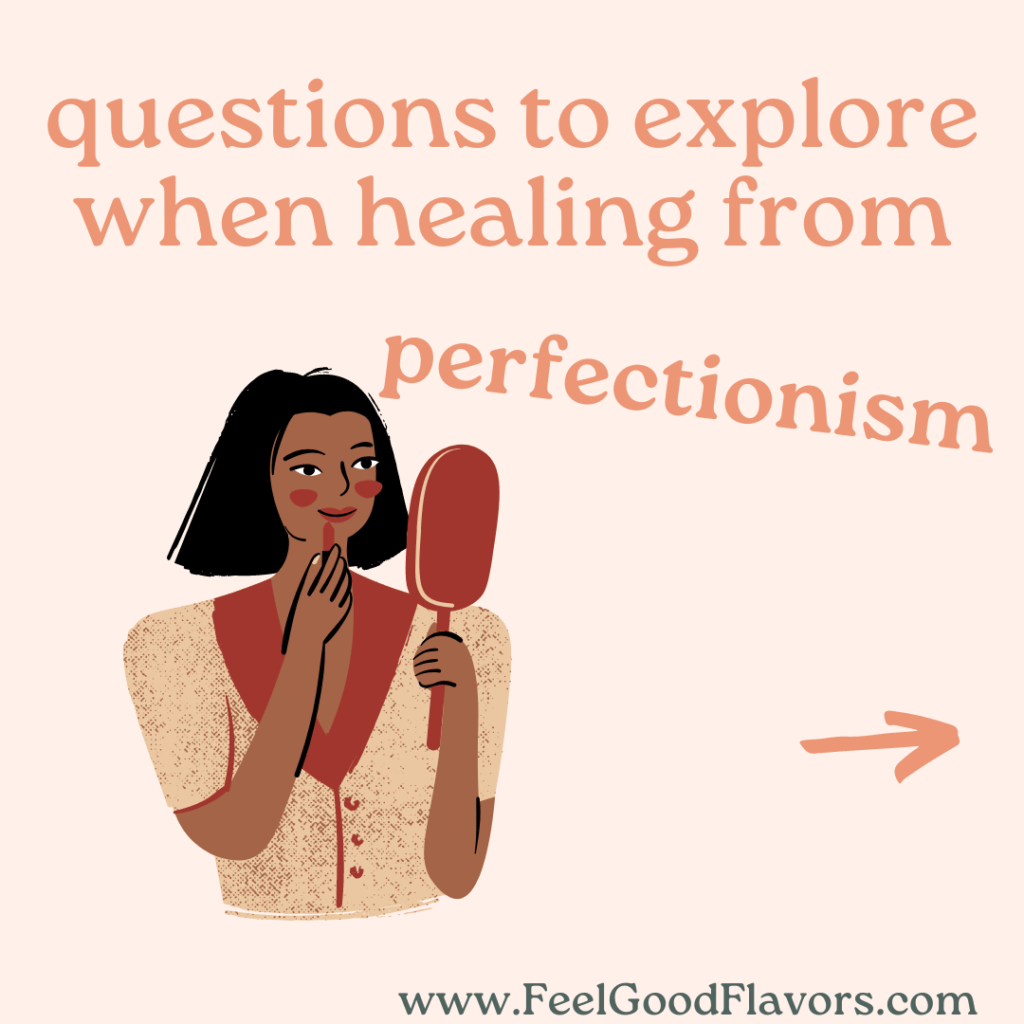People experiencing perfectionism understand the pressure that goes into having a ‘perfect façade’ and never making a single mistake, especially when it comes to food. Unfortunately, perfectionism and disordered eating go together like fire and gasoline.
The pursuit of perfectionism can intensify self-criticism, heighten stress levels, and increase eating disorder behaviors. If you’re tired of the constant pressure that comes with feeling self critical, read this post.
Here are five practical steps you can use to work on healing your perfectionism and relationship with food and your body.
Explore the Perfectionism-ED Connection:
Perfectionism and eating disorders go hand in hand. As humans, we all understandably want to feel safe. By trying to eat ‘perfectly’, many of us are trying to find safety in the food rules we have held for many years. When you start to notice your patterns, you can start to make small changes to see what happens. (It’s important to try to stay away from judging your patterns as well!).

- How do you react when you are feeling stressed or your nervous system is dysregulated?
- How does this affect the way that you eat?
- Do your thoughts about body image and self criticism get louder in any particular situations?
- What emotions come up for you when you do not eat in a way you had planned to?
- What food rules do you have for yourself?
Setting Realistic Expectations:
Perfectionism often leads to setting unattainable goals, setting you up for disappointment, self-criticism, and feeling like you failed. Instead, focus on setting very (VERY!) small, realistic and achievable goals for your recovery journey. Break larger goals into smaller, manageable steps, celebrating each tiny win along the way. Remember, recovery is a non-linear process.
Cultivating Self-Compassion:
Practicing self-compassion can be so incredibly challenging! It can be especially tough if we were never taught how to practice self-compassion as children. Self compassion is about the journey, not the destination. Self-compassion goals should also be incredibly small, as you are learning a skill that you have not practiced for many years, if ever! Think about how you might react to your situation as if you were talking to your friend. What language might you use? How might you show them some grace and support? Again, this is a tricky one that takes practice!
Embracing Mistakes as Learning Opportunities:
Perfectionism often stems from a fear of making mistakes. When was the last time you made a mistake? Can you think of any positives that came with the situation?
One other activity that can be helpful with embracing mistakes is doing some kind of activity imperfectly. For example, I am not trained in drawing, and frankly my art is not very advanced or beautiful. Even though I am not creating masterpieces that belong in a museum, I still enjoy drawing for the process and creativity, accepting that I will make mistakes and make… well, bad art! Think about what kind of skill or hobby you could try imperfectly. Maybe baking bread, knitting, sculpting, doodling, or singing. Practice doing your skill imperfectly, and sitting in the discomfort.
Seeking Support:
A therapist you trust can help you process some of the emotions and experiences that come up while you are challenging your old patterns. We highly recommend working through all of the steps in this blog post with a therapist for guidance! This is really an essential step. You don’t have to do this journey alone. Of course it is also great to have an intuitive eating dietitian on your team as well. We love to collaborate with other providers to provide you with excellent support. We also know it can be difficult to find a new therapist – if you want our recommendations for referrals you are welcome to email us at Lindsay@feelgoodflavors.com
Recovering from an eating disorder is challenging, and it is essential to seek support along the way. Surround yourself with a compassionate treatment team, including a qualified dietitian specializing in eating disorders, therapists, and support groups. Connecting with people who understand your struggles can provide validation, encouragement, and practical guidance.
Overcoming perfectionism in eating disorder recovery is no easy journey. By exploring your patterns, setting realistic expectations, cultivating self-compassion, embracing mistakes as learning opportunities, and seeking support, you can gradually break free from the chains of perfectionism and embrace a healthier, more balanced approach to recovery.
Remember, the goal is progress, not perfection. Each step you take, no matter how small, brings you closer to a life full of the values that are most important to you.
- Feel peace around food
- Accept your body where you are at
- Break generational chains of dieting
I believe in you!

Want to be kept up to date on new blog posts and tips for eating disorder recovery and intuitive eating?

